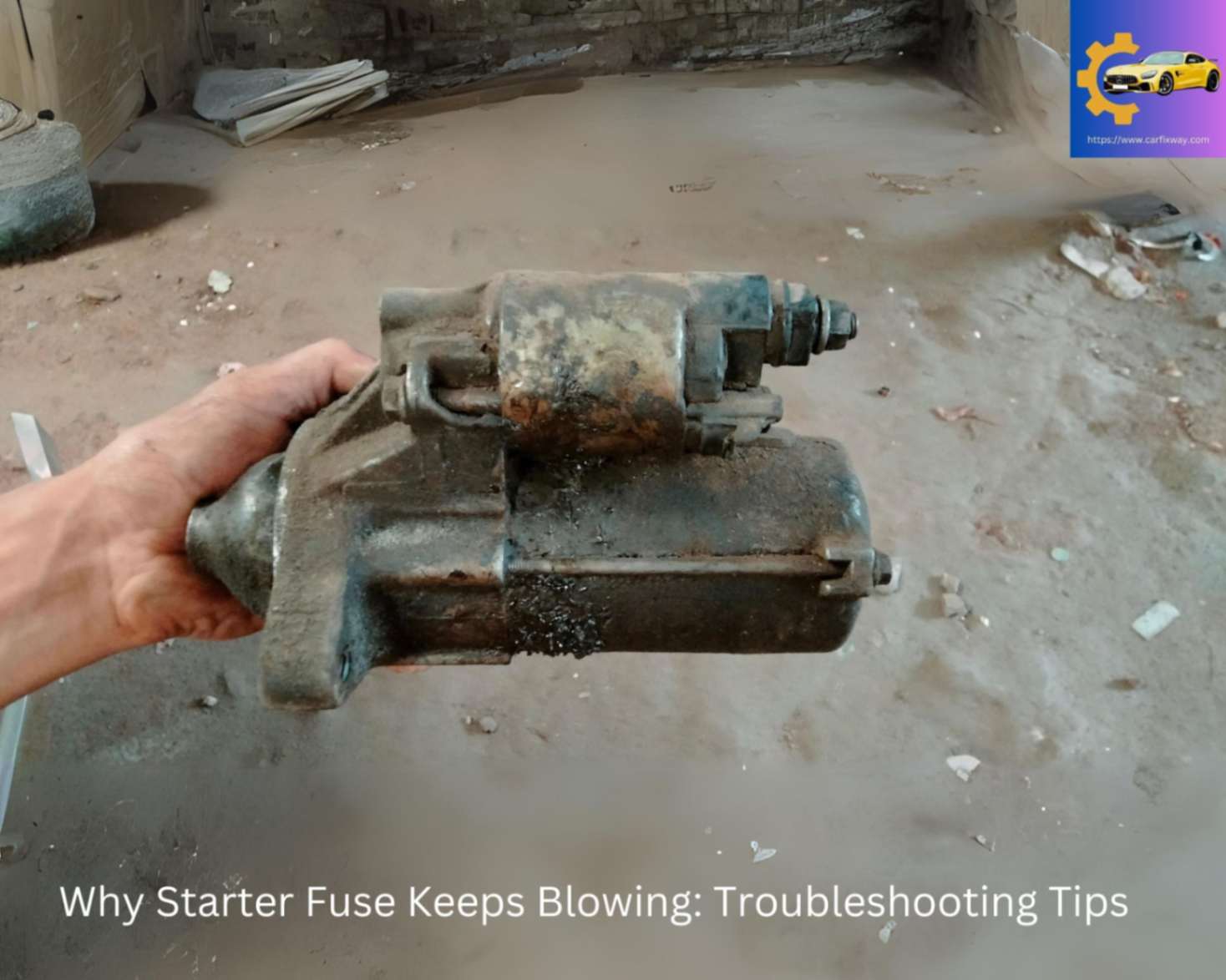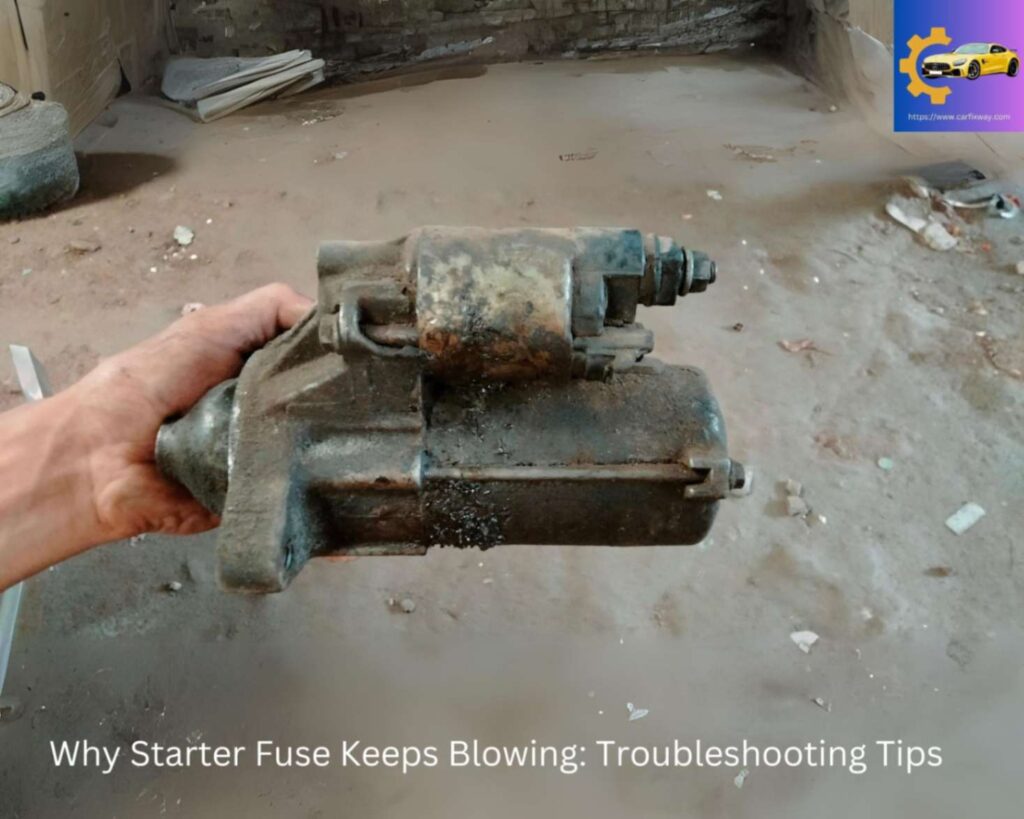Phone:
(701)814-6992
Physical address:
6296 Donnelly Plaza
Ratkeville, Bahamas.


Is your starter fuse keeps blowing and causing you endless frustration? This common problem can leave you stranded and wondering what’s going wrong with your vehicle’s electrical system. Understanding why the fuse blows and how to fix it can save you time, money, and headaches.
The main reason a starter fuse keeps blowing is often due to an underlying electrical issue. Whether it’s faulty wiring, a bad starter motor, or a short circuit, identifying the root cause is crucial for preventing further damage. In this article, we’ll guide you through the most likely reasons and the steps to take to fix the problem.
By the end of this guide, you will have a clear understanding of why your starter fuse keeps blowing and how to address it. We’ll provide detailed explanations, easy-to-follow steps, and practical tips that you can apply immediately. Let’s dive in and ensure your car starts smoothly every time!
Overloading happens when the electrical system receives more current than it can handle. For example, if too many high-power devices are connected to a single circuit, the wiring overheats, leading to a blown fuse. This is a safety measure to prevent damage to the wiring or, worse, a potential fire.
A short circuit occurs when there is poor insulation between two conductors, causing electricity to flow where it shouldn’t. This leads to an excessive current, which can blow the fuse. This often happens due to damaged or exposed wiring, moisture, or improper installation.
Therefore, overloading and short circuits can cause serious damage to the car’s electrical system if left unchecked. Regular maintenance and inspections are crucial to preventing these issues from recurring.
A faulty starter motor can cause repeated fuse blowing, frustrating your car’s start-up process. If the starter motor isn’t functioning correctly, it may overload the fuse. Here’s how to solve it:
Battery issues, especially a weak or dead battery, may lead to blown fuses due to excessive current draw. This can easily be fixed by ensuring your battery is in good condition. Here’s how:
By addressing these issues, you can prevent fuse blowouts and ensure a smooth start every time.
A blown starter fuse can stop your car from starting, even if the battery has power. The first thing you’ll notice is that the engine won’t crank, but the dashboard lights will still turn on. If you suspect a blown fuse, it’s important to act fast to prevent further damage.
Problem: Your car won’t start.
Agitation: This could leave you stranded.
Effect: Replace the blown fuse quickly to keep your vehicle running safely.
Signs:
A multimeter is a quick tool to check if a fuse is working or blown. First, set your digital multimeter to measure resistance. Then, touch the probes to each side of the fuse. If the reading is similar to your initial one, the fuse is good. If it shows “OL” or no reading, the fuse is blown.
Problem: Unsure if the fuse is blown.
Effect: Not knowing can waste time and cause bigger issues.
Solution: Use a multimeter to test and confirm.
Fixing a blown starter fuse may seem overwhelming, but don’t worry! Follow these simple steps to troubleshoot the issue:
Having the right tools can make troubleshooting quick and easy. Here’s what you’ll need:
Safety always comes first when working with electrical components. Here’s what you must do:
Keeping your vehicle’s electrical system in check is essential to avoid blown fuses. Regular maintenance helps catch small problems before they become big issues.
Upgrading the fuse and wiring can ensure your system handles current demands. This prevents overloads and potential fuse blows.
Too many devices on one circuit can cause fuse issues. It’s critical to balance the load on your system.
Having trouble with a blown starter fuse?
Follow this simple guide to get it fixed fast. If the fuse blows again shortly after replacement, it could indicate a more serious issue that requires professional help.
Want to replace a fuse safely and effectively?
Here’s how to do it step-by-step to avoid any electrical mishaps. When replacing a fuse, it’s important to follow safety measures to prevent further damage.
These steps will help you manage blown fuses with ease. However, if you encounter repeated issues, professional help is recommended.
Problem: Using the wrong fuse type can lead to electrical hazards or repeated fuse blowouts. The fuse must match the amperage of the system to prevent further damage.
Solution: Always check the amperage rating of the blown fuse and replace it with an exact match. Using a higher-rated fuse is dangerous.
Problem: Simply replacing a fuse without addressing the root issue (e.g., short circuits or overloads) can lead to recurring problems.
Solution: Investigate why the fuse blew in the first place. Ignoring the cause will likely result in the same issue happening again.
When your car shows these signs, it’s time to act fast. One single “click” when turning the key could point to a faulty starter solenoid. Repeated “clicking” usually means a dead battery. Here’s what to look out for:
If the usual checks don’t reveal the issue, it’s time to seek professional help. The cost of fixing a starter fuse can vary. Common expenses include parts and labor. Here’s a breakdown:
If your starter fuse keeps blowing, it’s crucial to identify the underlying cause, as this can lead to more severe electrical issues if left unresolved. Start by checking the wiring and replacing any damaged components, such as the starter motor or ignition switch. Ensuring all connections are secure and clean can prevent recurring problems. Taking prompt action not only protects your vehicle but also saves you from costlier repairs down the road.
A bad starter motor, faulty wiring, or a damaged ignition switch could cause the starter fuse to blow. These components may draw too much current, causing the fuse to overload.
Yes, a blown starter fuse can prevent the car from starting by interrupting the electrical flow to the starter motor.
You might hear clicking sounds when starting the car, or the car may not start at all. The starter fuse might also appear burnt or darkened.
First, inspect the fuse for damage. If it’s blown, replace it. If it keeps blowing, check for faulty components like the starter motor or wiring.
A short circuit in the wiring or a bad starter relay may cause a newly replaced fuse to blow right away.
Yes, a malfunctioning ignition switch can draw excess current, leading to a blown starter fuse.
Replacing a starter fuse is relatively inexpensive, often costing under $30. However, if other components like the starter need replacing, costs can rise significantly.
Yes, overheating of the engine or starter components can increase the electrical load, causing the fuse to blow.
If the starter motor is faulty and causing the fuse to blow, replacing the motor can resolve the issue. It’s a good idea to check for other faults first.
Yes, damaged or shorted wiring can cause excessive current, leading to a blown fuse. Inspect the wiring and repair any damaged areas.